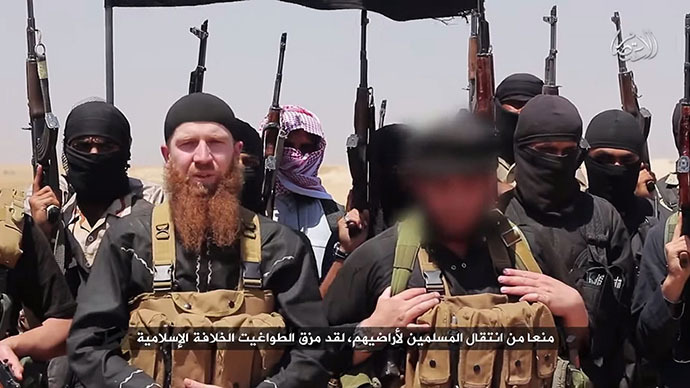‘US policy in Iraq shredded it as national entity’

Atrocities committed by ISIS in Iraq did not generate a US response, but the desire to protect Kurdish oil-rich fields from the Islamic Group prompted Washington to carry out military strikes, anti-war activist Brian Becker told RT.
RT:Do you think we could see a coup attempt by Maliki here?
Brian Becker: Well we can see the US government has made its move. They want Maliki gone. They believe that there needs to be a new face in the Iraqi government, a new way to patch together a unity government in order to save the country, or to prosecute the struggle against ISIS, the Islamic State.
Maliki who was, as you've said, hand-picked by the US in 2006 and has ruled with an iron fist and has carried out a war against Sunni areas, a war that is a sectarian, a war that is brutal, a war that has alienated that parts of the population and fractured the country. Maliki does not want to go and now he is accusing of a possible coup d’état. It was the president in Iraq, who is a Kurd that US has set up a confessional system a la Lebanon, and so the presidency is held by a Kurd, so he was the one that announced that there should be a new slate, a new prime minister. Maliki has hunted down their tanks in the green zone.
We don’t know what will happen. It is possible that Iraq is coming apart again, as a consequence, a direct consequence of US intervention and their occupation strategy was reckless, feckless, and now we can see a failed policy.
RT:And now will all this change at the top, with all this uncertainty at the top, might the Islamic State use that to try to make it inwards into Baghdad?
BB: Well, the US is signaling with the recent airstrikes in Erbil in the Kurdish area, that there are certain red lines. I think they are willing to let the Islamic State hold big parts of Iraq and not challenge them. But if they come to Baghdad, which is the center of US influence, or Erbil which is the center of the Kurdish regional government, another center of US influence or Jordan, that will be a red line. They are signaling the Islamic State “We don't necessarily challenge where you hold the territory but don’t challenge US interests where America still has a decisive influence in those parts of Iraq or in Jordan which are considered strategic assets.”
RT:What is the worst case scenario, we’ve got some top US officials saying that the Islamic State, the jihadists are a direct threat to the West. An image being used to back up these claims is an image of an Australian boy holding up a severed head of a Syrian soldier. Is it a threat to the West?
BB: Well, if the Islamic State threatens to take the Kurdish regional government Erbil, where a lot of the oil is, or if they take Baghdad or try to, where they control the southern oil regions of Iraq, or if they move on Jordan which is considered as a strategic asset, the US will view it as a threat to the West. ISIS, the Islamic State, is a reactionary, awful organization. But why is it in existence, why did it get strong? Because the US fueled arms into the civil war in Syria, fueling arms to that same entity and of course the US fractured Iraq allowing this group to grow. Three years ago they had six military operations, just six. And now they are a dynamic military force, again as a consequence, perhaps an unintended consequence, but a consequence nonetheless of US policy in Iraq that has shredded that country as a national entity.
RT:The US says it’s trying to do its best to try to make amends of that and has just carried out its fifth strike. Is it there because of the oil wells or because of the humanitarian crisis or a bit of both?
BB: We can see that the Islamic State has carried out executions, mass executions in Syria and in other parts of Iraq. That by itself did not generate a US military response, but when they threatened Erbil, which as I said is the center of Kurdish regional government where Iraq’s northern oil supplies are, or if it threatens Baghdad, then of course it becomes an imperative mode for the US to try to carry out military strikes.
It is not the humanitarian crisis that is generating US policy. The US government is careless, it’s cynical about humanitarian causes and needs but they always dress up their mission with a noble-sounding cause – humanitarian of course is one of them.
The statements, views and opinions expressed in this column are solely those of the author and do not necessarily represent those of RT.
The statements, views and opinions expressed in this column are solely those of the author and do not necessarily represent those of RT.












